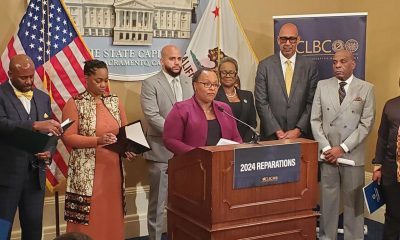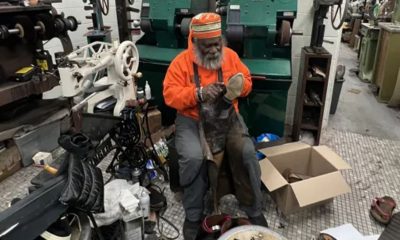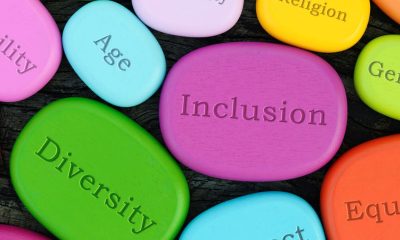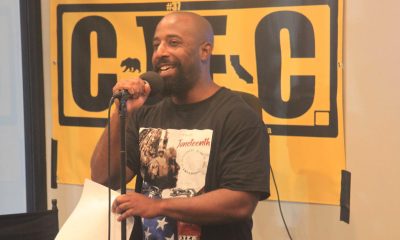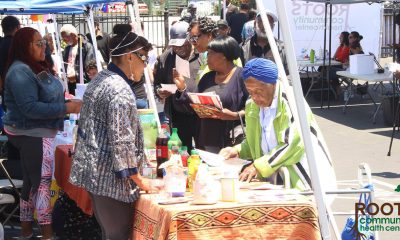Community
International Black Reparations Summit Meets This Week
The Institute of the Black World 21st Century (IBW), a leading research, policy and advocacy group with offices in New York and Baltimore, is holding an International Reparations Summit this week at various sites across New York City.
Speakers at the conference include Prof. Sir Hilary Beckles, vice-chancellor of the University of the West Indies and chair of the Caribbean Community’s (CARICOM) Reparations Commission; civil rights leader Rev. Jesse Jackson, Prof. Charles Ogeltree of Harvard University and Mireille Fanon Mendes France, president of the Frantz Fanon Foundation and chair of the UN Working Group of Experts on People of African descent and daughter of Frantz Fanon, the Black liberation theoretician and psychiatrist from Martinique.
<p>
During the summit, scheduled to run from April 9 to April 12, U.S. Rep. John Conyers Jr. (D-Mich.), the most senior member of Congress and the dean of the Congressional Black Caucus, will be honored for authoring HR 40, the “Commission to Study Reparation Proposals for African Americans Act,” and for his 50 years of service on Capitol Hill.
“We are delighted that the Institute of the Black World can be a clearinghouse for ideas and strategies on how to pursue reparations for historical crimes and injustices against people of African descent in the US and across the Americas,” said Dr. Ron Daniels, the institute’s president. “The courageous decision by nations in the Caribbean to demand reparations from the former European colonialists for Native Genocide and African enslavement, and the formation of a CARICOM Reparations Commission is re-energizing the Reparations Movement in the U.S. and throughout the Pan African world.”
Scores of reparations advocates, Pan-Africanists and social justice activists from across the USA, Canada, Europe, Latin America and the Caribbean are taking part in the New York summit. Leaders of national reparations commissions, committees and task forces from 11 CARICOM nations will interface with leaders of the recently formed European Reparations Commission and with members of the National African-American Reparations Commission (NAARC) which will be formally launched during the conference.
The NAARC will be comprised of some of the leading scholars, activists, attorneys, economists and historians in Black America. In the months ahead, the NAARC will hold a series of town hall meetings across the country designed to solicit ideas from African-American communities on what should constitute a comprehensive program that advocates for reparations for the historical crimes of slavery and segregation.
“The main purpose of the International Summit is to advance the public discussion and debate around reparations issues and to provide a platform for advocates from around the world to dialogue, learn from each other, strategize collectively, support and reinforce each other’s campaigns, build bridges across geographical and linguistic barriers and co-ordinate action plans,” said Don Rojas, IBW’s director of communications. “The international nature of this summit is unprecedented in the long (and all too often ignored and marginalized) history of the reparations movement in the Americas.”
The conference, whose opening and closing public sessions are to be Webcast and audio cast live by WBAI-Pacifica Radio and Sirius XM Satellite Radio, will be held in three of New York City’s five boroughs—Manhattan, Brooklyn and Queens.
The conference begins at the historic Mother AME Zion Church in Harlem, the oldest black church in New York State and a center for the Underground Railroad back in the 19th Century. The business sessions will be held at York College in Queens and the summit will conclude with a public rally at the First AME Zion Church in Central Brooklyn, home to the largest Caribbean community in the United States.
One of the highlights at the closing rally will be inspirational music sung by a newly formed ‘Reparations Choir’, composed of members from several black churches in Brooklyn.
The three-day meeting will honor pioneers in the fight for reparations for Black Americans, including Callie House (1861-1928), a former slave who demanded that $68 million in taxes on Confederate cotton seized by the North be given to Blacks as reparations, and Queen Mother Moore (1898-1997), a longtime Harlem activist who popularized the reparations idea in the middle 20th century. It will also pay tribute to the tireless work over many years of The National Coalition of Blacks for Reparations in America (N’COBRA).
Activism
Oakland Post: Week of April 17 – 23, 2024
The printed Weekly Edition of the Oakland Post: Week of April 17 – 23, 2024

To enlarge your view of this issue, use the slider, magnifying glass icon or full page icon in the lower right corner of the browser window. ![]()
Activism
Oakland Schools Honor Fred Korematsu Day of Civil Liberties
Every Jan. 30, OUSD commemorates the legacy of Fred Korematsu, an Oakland native, a Castlemont High School graduate, and a national symbol of resistance, resilience, and justice. His defiant stand against racial injustice and his unwavering commitment to civil rights continue to inspire the local community and the nation. Tuesday was “Fred Korematsu Day of Civil Liberties and the Constitution” in the state of California and a growing number of states across the country.

By Post Staff
Every Jan. 30, OUSD commemorates the legacy of Fred Korematsu, an Oakland native, a Castlemont High School graduate, and a national symbol of resistance, resilience, and justice.
His defiant stand against racial injustice and his unwavering commitment to civil rights continue to inspire the local community and the nation. Tuesday was “Fred Korematsu Day of Civil Liberties and the Constitution” in the state of California and a growing number of states across the country.
One OUSD school is named in his honor: Fred T. Korematsu Discovery Academy (KDA) elementary in East Oakland.
Several years ago, founding KDA Principal Charles Wilson, in a video interview with anti-hate organization “Not In Our Town,” said, “We chose the name Fred Korematsu because we really felt like the attributes that he showed in his work are things that the children need to learn … that common people can stand up and make differences in a large number of people’s lives.”
Fred Korematsu was born in Oakland on Jan. 30, 1919. His parents ran a floral nursery business, and his upbringing in Oakland shaped his worldview. His belief in the importance of standing up for your rights and the rights of others, regardless of race or background, was the foundation for his activism against racial prejudice and for the rights of Japanese Americans during World War II.
At the start of the war, Korematsu was turned away from enlisting in the National Guard and the Coast Guard because of his race. He trained as a welder, working at the docks in Oakland, but was fired after the bombing of Pearl Harbor in 1941. Fear and prejudice led to federal Executive Order 9066, which forced more than 120,000 Japanese Americans out of their homes and neighborhoods and into remote internment camps.
The 23-year-old Korematsu resisted the order. He underwent cosmetic surgery and assumed a false identity, choosing freedom over unjust imprisonment. His later arrest and conviction sparked a legal battle that would challenge the foundation of civil liberties in America.
Korematsu’s fight culminated in the Supreme Court’s initial ruling against him in 1944. He spent years in a Utah internment camp with his family, followed by time living in Salt Lake City where he was dogged by racism.
In 1976, President Gerald Ford overturned Executive Order 9066. Seven years later, the 9th Circuit Court of Appeals in San Francisco vacated Korematsu’s conviction. He said in court, “I would like to see the government admit that they were wrong and do something about it so this will never happen again to any American citizen of any race, creed, or color.”
Korematsu’s dedication and determination established him as a national icon of civil rights and social justice. He advocated for justice with Rosa Parks. In 1998, President Bill Clinton gave him the Presidential Medal of Freedom saying, “In the long history of our country’s constant search for justice, some names of ordinary citizens stand for millions of souls … To that distinguished list, today we add the name of Fred Korematsu.”
After Sept. 11, 2001, Korematsu spoke out against hatred and discrimination, saying what happened to Japanese Americans should not happen to people of Middle Eastern descent.
Korematsu’s roots in Oakland and his education in OUSD are a source of great pride for the city, according to the school district. His most famous quote, which is on the Korematsu elementary school mural, is as relevant now as ever, “If you have the feeling that something is wrong, don’t be afraid to speak up.”
Community
For Cervical Cancer Month, Medical Community Focused on Education
January was Cervical Cancer Awareness Month. Physicians, advocates and others in the medical community commemorated the month by raising awareness about a form of cancer they say is highly preventable and treatable. Cervical cancer is caused by a virus called the human papillomavirus (HPV) and it develops slowly over time but can be prevented with proper care in girls as young as 13 years old.

By Magaly Muñoz
January was Cervical Cancer Awareness Month.
Physicians, advocates and others in the medical community commemorated the month by raising awareness about a form of cancer they say is highly preventable and treatable.
Cervical cancer is caused by a virus called the human papillomavirus (HPV) and it develops slowly over time but can be prevented with proper care in girls as young as 13 years old.
Sonia Ordonez, an OBGYN and gynecology surgeon at Kaiser Permanente, stated that as soon as people with cervixes reach the maturity reproductive age, they should start taking preventative measures like getting the HPV vaccine. The vaccine involves a series of two-doses for people aged 9 through 14 or three-doses for people 15 through 45 years old.
“I see a lot of young women who can’t remember or may not have gotten [the vaccine] when they were younger, or maybe got one, but we can give them the series of vaccines and restart at any point in time,” Ordonez said.
She said that cervical cancer is not the only cancer caused by HPV. Strains of the virus can also lead to throat, anal and penile cancers.
Screening is also an effective way to check for cervical cancer and should be done every three years after someone turns 21, doctors recommend. It is best to start as early as possible to catch occurrences early.
Ordonez said that this cancer is also more likely found in people of color and has led to more deaths overall.
A Mayo Clinic article published last month stated that Black women are more likely to be diagnosed and die of cervical cancer, compared to White women in the U.S.
2,000 Black women are diagnosed every year with cervical cancer and 40% die as a result.
“This disparity is not due to genetic differences among White, Black or Hispanic women, but rather related to systemic racism, access to healthcare and socioeconomic factors,” Dr. Olivia Cardenas-Trowers, a Mayo Clinic urogynecologist, said in the article.
Ordonez stated that immigrant women are also highly susceptible to the cancer, as many Latin American countries may not have accessibility to screenings or lack of insurance makes it harder for them to get tested.
Hispanic women are 40% more likely to be diagnosed with cervical cancer, and 30% more likely to die from it, as compared to non-Hispanic White women, according to the Office of Minority Health.
Family medicine physician, Joy Anyanwu, stated that the pandemic contributed to hesitancy about getting cervical cancer screenings among some women. Other factors are people’s aversion to vaccines, parents not wanting to believe that their children are or will become sexually active, and doubt about the overall effectiveness of the vaccine.
“The vaccine is very safe — over 97% effective in preventing cervical cancer,” Anyanwu said. “Even if you aren’t having sex, the earlier you start would actually help.”
Anyanwu said she understands that parents might not want to ask questions about their children’s reproductive health, but it’s a mindset that can be a barrier to having important conversation about prevention or care.
To keep families their families and communties healthy, the doctor emphasized that people should prioritize keeping up with their vaccine series and going to screenings every year.
-

 Activism4 weeks ago
Activism4 weeks agoOakland Post: Week of March 20 – 26, 2024
-

 #NNPA BlackPress3 weeks ago
#NNPA BlackPress3 weeks agoCOMMENTARY: D.C. Crime Bill Fails to Address Root Causes of Violence and Incarceration
-

 #NNPA BlackPress4 weeks ago
#NNPA BlackPress4 weeks agoFrom Raids to Revelations: The Dark Turn in Sean ‘Diddy’ Combs’ Saga
-

 #NNPA BlackPress3 weeks ago
#NNPA BlackPress3 weeks agoMayor, City Council President React to May 31 Closing of Birmingham-Southern College
-

 #NNPA BlackPress4 weeks ago
#NNPA BlackPress4 weeks agoCOMMENTARY: Lady Day and The Lights!
-

 Activism3 weeks ago
Activism3 weeks agoOakland Post: Week of March 27 – April 2, 2024
-

 #NNPA BlackPress4 weeks ago
#NNPA BlackPress4 weeks agoBaltimore Key Bridge Catastrophe: A City’s Heartbreak and a Nation’s Alarm
-

 #NNPA BlackPress4 weeks ago
#NNPA BlackPress4 weeks agoBaltimore’s Key Bridge Struck by Ship, Collapses into Water




